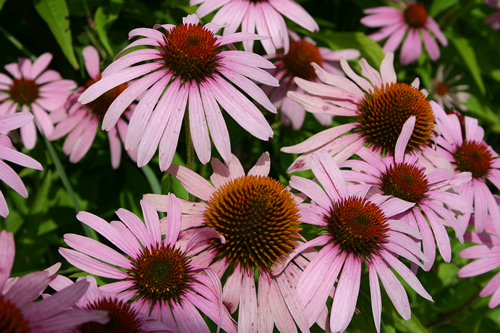Description
Botanical: Echinacea purpurea
Other common names: Red Sunflower, Purple Coneflower, Black Sampson, Hedgehog, Coneflower, Snake Root, Sampson Root, Rudbeckia, Comb Flower, Indian Head
With a reputation as nature's best immune system enhancer, Echinacea Purpurea is believed to be one of nature's most powerful natural antibiotics. Considered the most potent of the Echinacea genus, Echinacea Purpurea helps to stimulate the body's resistance to infection, diseases, fever and blood poisoning. When you feel the flu or common cold coming on, reach for Echineacea, the "must-have" herb, for relief.
Country of Origin: United States.
Beneficial Uses:
Echinacea Purpurea works by helping to crank-up the immune system to ward off disease and infection. There is evidence that it may mimic the action of interferon, a natural chemical in the body that is capable of shielding cells from viral invasion. Considered an antiviral and antibacterial, Echinacea not only kills bacteria and viruses but also actually strengthens immunity by increasing the number of white blood cells in the blood stream. According to German researchers, the herb is said to increase the levels of infection-fighting T-cells by thirty percent, thereby helping to build and strengthen the immune system. The German Commission E reported that E. purpurea has shown immuno-stimulant effects in several ways: The number of white blood cells and spleen cells is increased, the capacity for phagocytosis by human granulocytes is activated, and the body temperature is elevated.
Echinacea is now considered one of the most effective detoxicants in Western medicine for circulatory, lymphatic and respiratory systems, particularly E. purpurea, which is considered more potent than other species. It is an excellent lymphatic tonic, cleansing the system of toxic materials, and may be particularly helpful in cases of swollen glands and enlarged prostate.
Further supporting Echinacea's role as a depurative, or agent that tends to cleanse and purify the blood by killing contaminants in the blood, the herb is believed to be effective in the treatment of blood poisoning and septicemia. Echinacea also cleanses morbid matter from the stomach and helps to expel poisons, toxins, pus and abscess formations in the body. Moreover, as a sweat-producing agent, Echinacea further helps to cleanse and detoxify the body of wastes through the skin.
Referred to as an antifungal, Echinacea Purpurea is said to be effective against vaginal yeast infections, such as Candida, and other fungal infections.
Echinacea Purpurea is being investigated for its possible indirect anticancer properties, via its general immune-enhancing effects. The stimulation of the herb's polysaccharides and phytosterols are particularly important, because they are the ingredients that appear to activate macrophages, the agents that engulf and digest tumor cells and destroy bacteria, viruses and infectious agents. According to Loyola University Health System information, some malignant diseases have been treated with Echinacea and the effect of chemotherapy may be improved with its use.
At the first sign of a cold, flu, fever, earache or whenever antibiotic action is required, take Echinacea. It is said to ward off and fight infections, or at least diminish their length and severity. For the prevention and treatment of upper respiratory tract infections, E. purpurea is believed to be the most potent Echinacea species for this indication and has been useful in cases of bronchitis.
Echinacea is considered an antiseptic and antibiotic that has a reputation for helping to combat any type of infection, bacteria, viruses and germs like no other; and has been thought to be effective in the treatment of urinary tract infection, staph infection, recurring kidney infection, food poisoning, poisonous bites (snakes and insects), syphilis, diphtheria and other putrid fevers. In Germany, it is used to fight bronchitis and abscesses.
Echinacea is called an anti-inflammatory and an effective agent that works to reduce the pain and swelling from injury and fights all types of inflammation, including sore throat, tonsillitis and hemorrhoids.
Echinacea Purpurea is believed to promote tissue regeneration. It is considered an "alterative," or herb that gradually converts an unhealthy organ condition to a healthy organ and gradually facilitates beneficial changes in body.
Used both internally and externally, Echinacea's effects as a healing herb for all types of skin problems and infections are said to be legendary, helping to ease cuts, cold sores, boils, carbuncles, acne, herpes and gangrene. One of its chemical properties, called echinacein, is not only thought to repel germs but also stimulate skin cell repair. Topically, it has been used to ease sunburned skin, infected or weeping eczema, plant poisoning (ivy, etc.), herpes lesions, wounds and other infected skin conditions.
Echinacea Purpurea is said to promote good digestion and help ease flatulence.
Contraindications:
Echinacea Purpurea Herbal Supplement is not recommended for pregnant women, individuals suffering from autoimmune disorders, those with allergies to daisies/ragweed/sunflowers or those receiving organ transplants. If taking prescription drugs, it is always wise to speak with a physician, as Echinacea may counter the effects of certain medications. Echinacea should not be given to children under two years, nor should it be used orally in long-term diseases, such as multiple sclerosis, tuberculosis, collagenosis, HIV or AIDS and autoimmune disorders (like lupus or rheumatoid arthritis).


